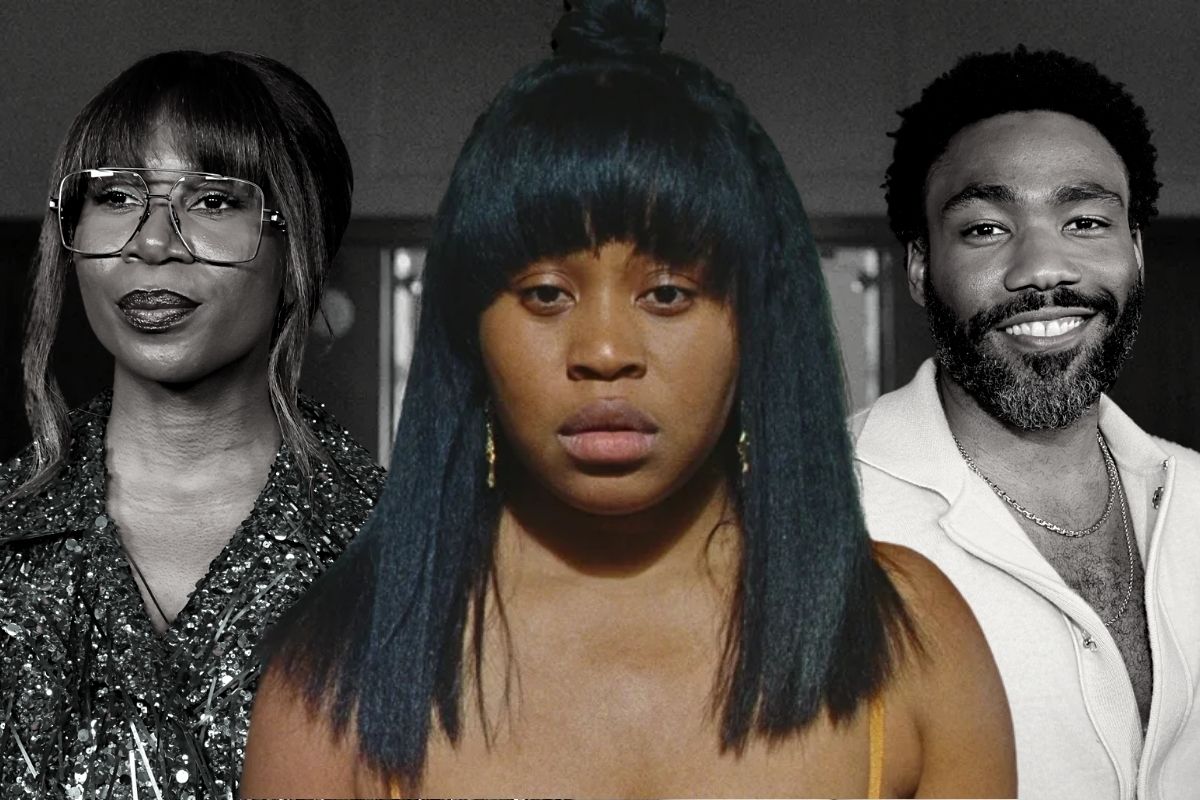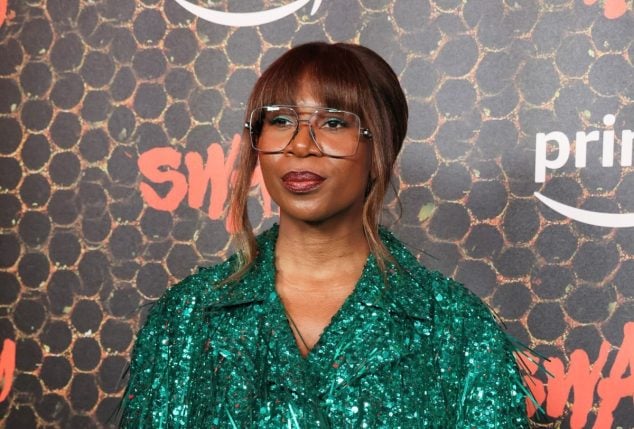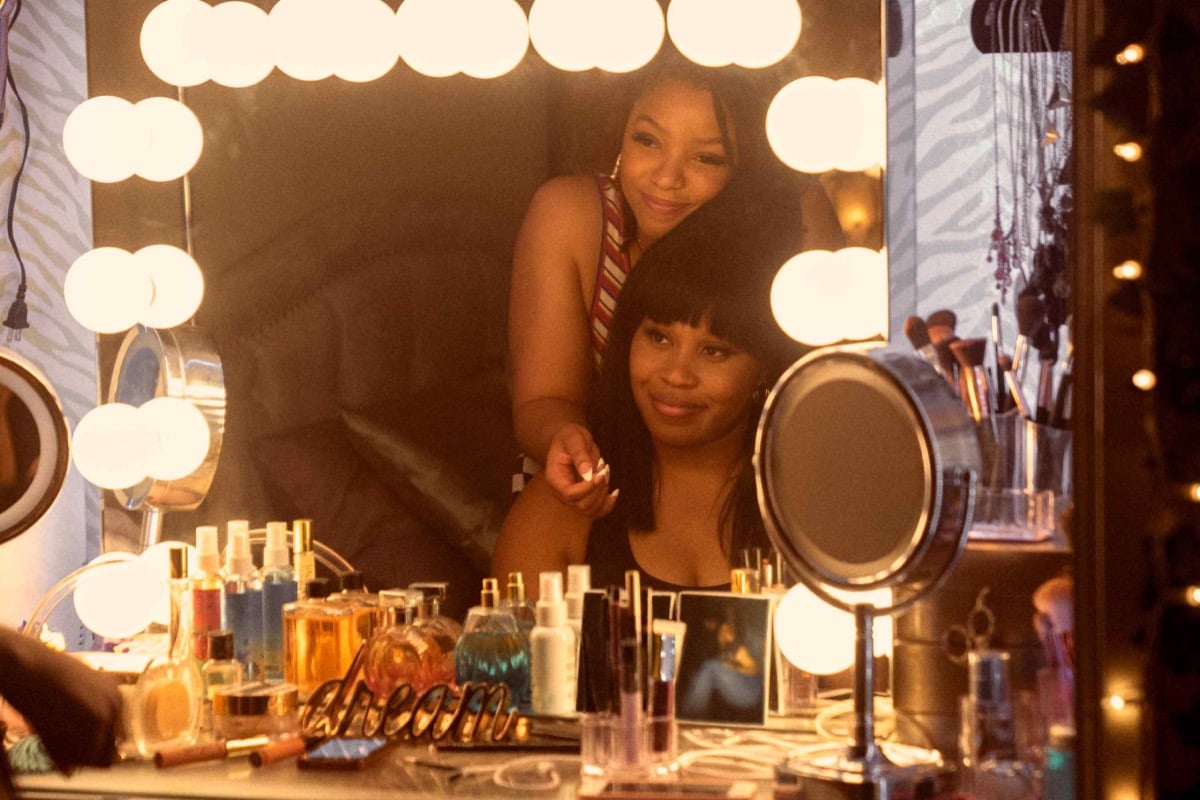The Only Thing More Distressing Than Watching ‘Swarm’ Is Hearing the Co-Creators’ Thoughts on It

Despite my better instincts to hold off a bit on watching Swarm, I did it, and now I’m left with lots of conflicting feelings. I see great performances and stunning visuals, but am simultaneously left unsatisfied and at a loss for words as to what I’m “supposed” to feel for the lead. The Amazon Prime show, co-created by Donald Glover and Janine Nabers, follows a distraught young woman named Dre (Dominique Fishback) on a murderous rampage following traumatic events.
While the marketing of the show seems bent on empathizng Dre’s obsession with Ni’jah (a satirical take on Beyoncé), the story itself doesn’t say much about stan culture. The relevance of the internet is barely even present in the series, unlike similar films. (Zola and Ingrid Goes West feel like they have a much better grasp on social media.) Instead, it focuses on Dre’s actions and gives us little reason to empathize, let alone root for, the antihero—an antihero whose writers drew inspiration from The Sopranos and Mad Men.
While a supporting character’s recent collab with an abuser had me side-eyeing the show, it really wasn’t the central reason I came into the story with my guard up. The responsibility for my initial misgivings goes to multi-disciplinary creative and co-creator Donald Glover. For over a decade, the writer and performer has—both in his work and in interviews—expressed disgusting views about women—especially Black women and Asian women. It’s gotten to the point that his music has been called “incel rap.”
The misogynoir in the room
Back in 2018, Glover and other “no one understands (Black) nerds woe is me” started to be thoroughly examined. As the understanding of incel behavior became a national discussion, with even the Wikipedia page being overhauled, many were given the words to describe what was a decade-plus of behavior from Glover.
With Asian women, a lot of it comes down to fetishization. He’s made orientalist and gross comments about his desire for them and their supposed submissiveness. Again, this is in lyrics across several albums and in interviews. It got to the point that a bar graph of his references per album was made by an unknown source. Another possible instance of this obsession comes in the form of a now-deleted Tumblr account Glover was accused of running. The account claimed to be a teenage Korean girl and a fan of the rapper Childish Gambino—the stage name and alt persona of Glover.
This list of misogynoir acts is too long to list even half. The highlights include jokes about white women bringing him to orgasm by calling him racial slurs in bed, and this 2011 interview.
For years defenders have tried to mark his more overt misogyny (including a number of rape jokes too frequent to count) as something he has grown past. After all, the examples above mostly happened before 2013. In the video above, he is older than I am now, at about 29. However, he’s never apologized, nor has he stopped. His show, Atlanta (2016-2022), has been criticized for its treatment of Vanessa (Zazie Beetz) throughout the series. She’s the sole Black woman lead and is—like most leading ladies in Black media—fair complected. Additionally, many episodes feature insular cringe-inducing depictions of Black women. Tami’s scene in the Champagne Papi episode is one infamous example. Also, the show features a Kevin Samuels cameo for funsies.
In 2022, Glover interviewed himself for Interview magazine and delved into this topic. By delve, I mean he acknowledged he was aware of the criticism and shrugged it off.
Are you afraid of Black women?
Why are you asking me that?
I feel like your relationship to them has played a big part in your narrative.
I feel like you’re using Black women to question my Blackness.
While Glover is undeniably talented, and you can see growth in his various crafts, his misogynoir barely shifts. It only really manifests differently—almost like it matures. One of the best reflections of his development as an artist, alongside his disturbing gender politics, was best summed up by writer Taylor Hosking in a 2018 VICE article following the release of the music video “Feels Like Summer”:
Strikingly, his refusal to respond to his critics about the West-Obama image mimics the same attitude of his cartoon; he seems to view himself more as a neutral commentator than a subject worth interrogating.
But no one, of course, is a neutral commentator, especially when it comes to topics like gender roles.
Naber erasure & excuses

All this is impossible to separate from Swarm. Complicating matters for me (at first) is Nabers. Despite being the co-creator and having more lead writer credits on the show (at a ratio of five to Glover’s one), media and viewers have consistently cut her out of the show’s conversations. A similar thing happened in 2021 with Candyman and Nia DeCosta, who directed the film and co-wrote it with Jordan Peele and Win Rosenfeld but was consistently overlooked by some in order to attribute the film to Peele.
On the opposite end, many have used Nabers’ role as a defense as if it disproves Glovers’ misogynoir. In a recent interview with Vulture, reporter Sam Sanders brought up the criticism in relation to the show’s response. Nabers defended him by saying,
It’s silly to say that. If you take a Black woman you admire and respect and give her a platform to then hire more Black women and cast incredible Black women — Donald did that. After Atlanta, he could’ve had anyone in this business, and he chose to work with me.
I don’t think I need to explain what’s wrong with this as a defense, but just in case: working with a certain demographic (or hiring them) doesn’t mean you respect them. Naber brings up Atlanta as an example. She is credited as a writer for seasons three and four. While criticism of women in Atlanta goes all the way back to season two, a lot of it was solidified in season three forward. (Also the season the show went from one Black woman in the writing room to three.)
Naber is not absolved from the criticism of the show. Additionally, her involvement doesn’t cancel out Glover’s.
Where this leaves me with Swarm

In watching the show, I was desperate to see something interesting in Dre. While there was certainly loneliness, she seemed to lack actualization. I couldn’t agree, disagree, or empathize because she didn’t seem all put together. There was loss and loneliness in her performance, but little else was there behind the otherwise beautifully shot show. (This is definitely a result of using real film and not going digital.) The “why” of many of the murders is absent. When you think you found the pattern, the show says “sike” with a lackluster response that’s unsatisfying to watch.
In reading the interviews from Glover and Nabers, I quickly saw why. When Fishback asked for backstory and motivation for Dre, both Nabers and Glover left her with nothing. According to Vulture, Glover stated,
I kept telling her, ‘You’re not regular people. You don’t have to find the humanity in your character. That’s the audience’s job.’ […] She really was lost a lot of the time. Think of it more like an animal and less like a person.
Actors in general, they want to get layered performances. And I don’t think Dre is that layered. I wanted her performance to be brutal. It’s a raw thing. It reminds me of how I have a fear with dogs because I’m like, ‘You’re not looking at me in the eye, I don’t know what you’re capable of.’
So a well documented misogynist says he wants her to act like a dog? Got it. He wants her to act like an animal and have the audience project humanity onto her—an audience programmed (regardless of race and gender) to do the opposite. Nabers gave Fishback similar advice by referencing the 2013 first contact flick Under the Skin. There, the main character is literally an alien. The only humanity given to Dre is that she loves her sister and music. That missing humanity runs counter to one of Naber’s goals of Swarm. She told Vulture,
At the end of the day, I would hope that Black women watch this show and feel like they are seeing a part of Black femininity they haven’t seen before, and they’re drawn to it.
Between the comments and my unease, I’ve looked at other reviews, desperate to make sense of what I watched—not the plot, but the show as an expression of art. The ones I find myself agreeing with the most include fandom writer Stitch’s piece for Teen Vogue and culture writer Shamira Ibrahim for Buzzfeed. They also have this uneasiness with the work that is both intended by the creators and not.
(featured image: Amazon Prime Video and Arnold Turner & Rodin Eckenroth for Getty Images – remixed by Alyssa Shotwell)
Have a tip we should know? [email protected]
